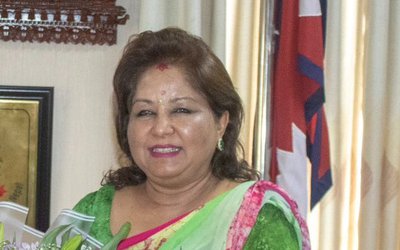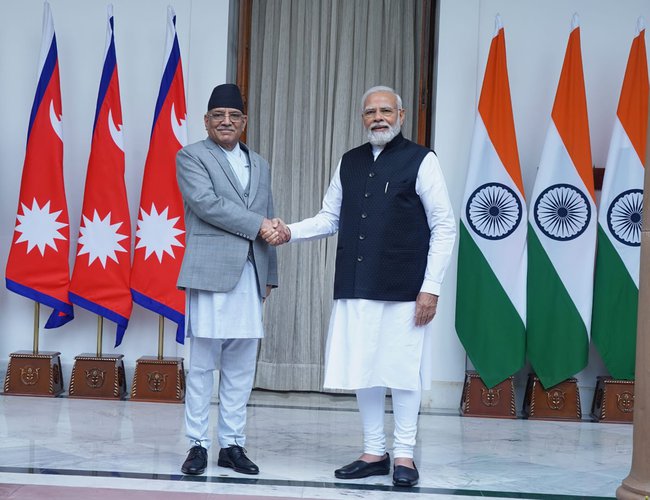
As anticipated, the main opposition CPN-UML and two other parties, Rastriya Prajatantra Party (RPP) and Rastriya Swatantra Party (RSP), deemed the visit a failure and prevented the House of Representatives from conducting business for two days in order to demand clarification from Prime Minister Pushpa Kamal Dahal Prachanda on his statement on border disputes and other issues.
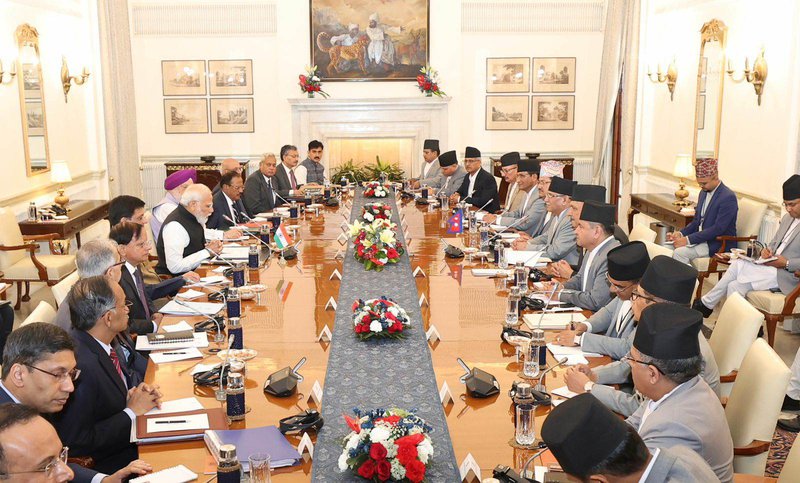
With so many significant accomplishments under his belt and promises from his Indian counterpart, Prime Minister Narendra Modi, to continue supporting Nepal, Prime Minister Prachanda answered all the opposition's queries in the House of Representatives with confidence, silencing the bench. In his presentation to the House of Representatives, PM Prachanda, supported by his coalition allies, particularly the Nepali Congress, hailed the four-day visit to India as a remarkable success.
Prime Minister Pushpa Kamal Dahal handled everything with ease under the direction of the chief secretary of the Prime Minister's Office, veteran diplomat Shanker Das Bairagi, and with the support of Bharat Raj Paudyal and his capable staff from the Ministry of Foreign Affairs.
In Parliament
Prime Minister Prachanda defended his team's performance in front of the media despite certain slip-ups brought on by poor communication. The delegation led by Prachanda signed seven crucial agreements with India as a result of the well-organized team.
"Our team has done a great job and has supported me as needed. In a meeting with India's national security adviser, Ajit Kumar Doval, there was some confusion, claimed Prachanda.
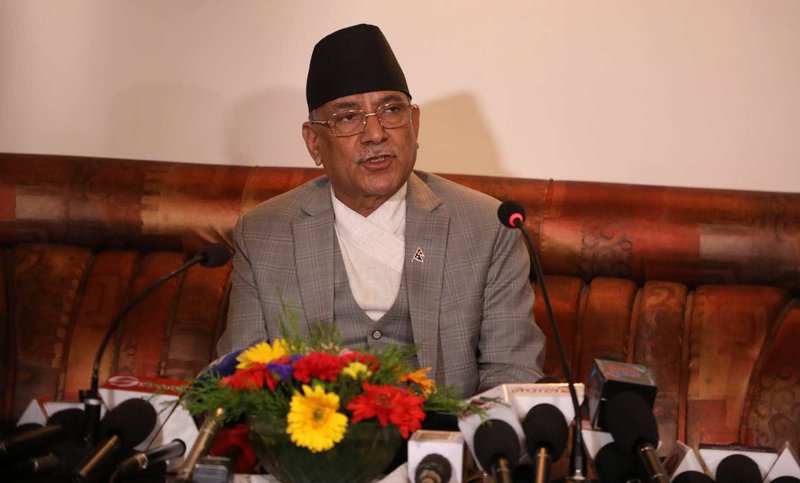
Prachanda emphasized the foundation and renewed trust created by the electricity trade agreement, noting that it will allow Nepal, a landlocked country, to satisfy private sector expectations.
He continued by saying that Nepal's access to the sea via Indian ports has been strengthened by the new transit agreement. Prachanda claims that the solution to the border problems is also well understood.
The already strong relations between the two countries were strengthened, as Prime Minister Prachanda made clear in his report to the House of Representatives on his visit.
I generally kept the pledges I made before traveling to India during this four-day vacation. There were several important contracts inked, which is remarkable in and of itself. Regarding the long-term power-sharing agreement, we have long pushed for the provision of 10,000 MW of electricity over a 10-year period, so I'm pleased that we were able to reach an agreement during my visit. The announcement was made directly by Prime Minister (Narendra) Modi, and the agreement's signing represents a significant turning point in our bilateral relations," said PM Prachanda.
The CPN-UML leader K.P. Sharma Oli continued to say that the deal will assist Nepal attract significant investments in the energy sector as he asked for clarification on the power trade and border concerns. In light of this agreement, PM Dahal also highlighted the possibility for large investments in the nation's energy industry.
A solution to the "boundary matter" was also mentioned by the prime minister of Nepal. "I spoke with Prime Minister Modiji on the boundary issue. I pleaded with Prime Minister Narendra Modi to settle the boundary dispute through the existing bilateral diplomatic process, Prachanda stated.
When asked if China was brought up, Foreign Secretary Vinay Kwatra responded that the two sides also discussed "wider developments in the region" at the later media conference. He claimed that when it came to talking about regional trends more broadly, "it went without saying that the two Prime Ministers talked about other regional developments, what challenges they pose to our bilateral cooperation, and how precisely India and Nepal should cooperate to mitigate those challenges."
PM Modi On Visit
Modi referred to the relationship between India and Nepal as "HIT" or Highways, I-ways, and Trans-ways in 2014. In order to make our cooperation a smashing success, we have made a number of important decisions today, Modi claimed. To increase collaboration between the two parties in a number of areas, including trade and energy, seven agreements were inked.
The two leaders essentially erected integrated checkpoints at Rupaidiha in Nepalgunj and Bahraich district of Uttar Pradesh. A cargo train from Bathnaha in Bihar to the Nepal Custom Yard was also flagged off by them.
PM Prachanda and I determined that initiatives connected to the Ramayana circuit should be hastened in order to further promote cultural and religious links, Modi stated.
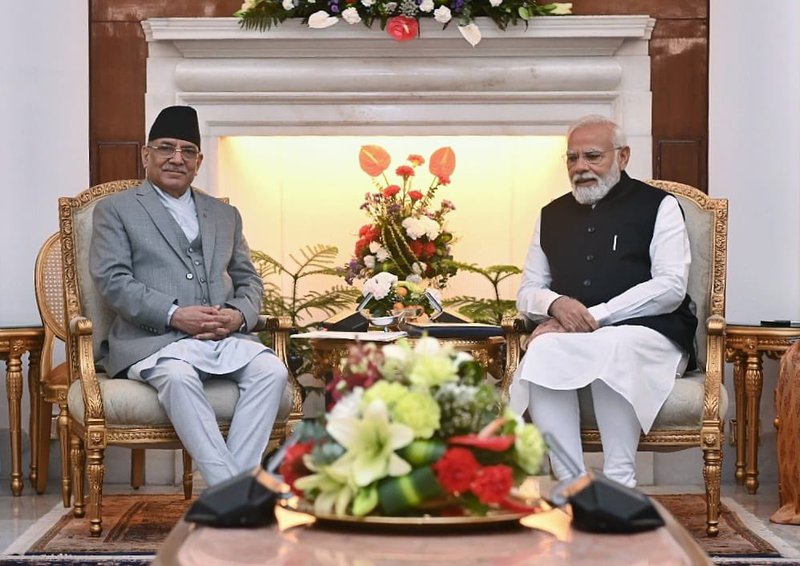
The Transit Treaty was signed by the two nations. According to Modi, the agreement also covers the building of interior canals and new railways with Nepal. The two parties also agreed that Indian Railways will train Nepali railway officials.
The two parties also inked six other memoranda of understanding (MoUs) or agreements to cooperate in areas such as cross-border digital payments, hydropower, and the oil and gas industry.
Following a meeting with his Nepali counterpart Pushpa Kamal Dahal 'Prachanda' on Thursday, Prime Minister Narendra Modi declared that India and Nepal would work together to advance their bilateral relations to "Himalayan heights" and settle all disputes, including boundary disputes.
"We'll keep trying to reach Himalayan heights in our relationship. After their bilateral talks in Delhi, Modi and Prachanda made a statement in each other's presence promising to settle all concerns, whether they be boundary-related or not.
PM Prachanda
The Lower Arun project, which has been given to the same company as the 900 MW Arun III project, was also mentioned by PM Prachanda during the speech. Both of these projects are now under progress.
According to PM Prachanda, this deal has also made it possible for Nepal to export 1,200 MW of electricity produced by the Upper Tamakoshi Hydropower Project to India.
PM Prachanda also asserted that he had eliminated mistrust in the two nations' bilateral relations.
"Modi-Ji stressed the importance of relations between India and Nepal, saying that they ought to be higher than the Himalayas. When he addressed the parliament, PM Modi mentioned his visit from 2014, which opened a novel chapter in our bilateral relations. He even referred to the occasions he attended as hits. We should now endeavor to make our relationships a huge success, Prachanda advised.
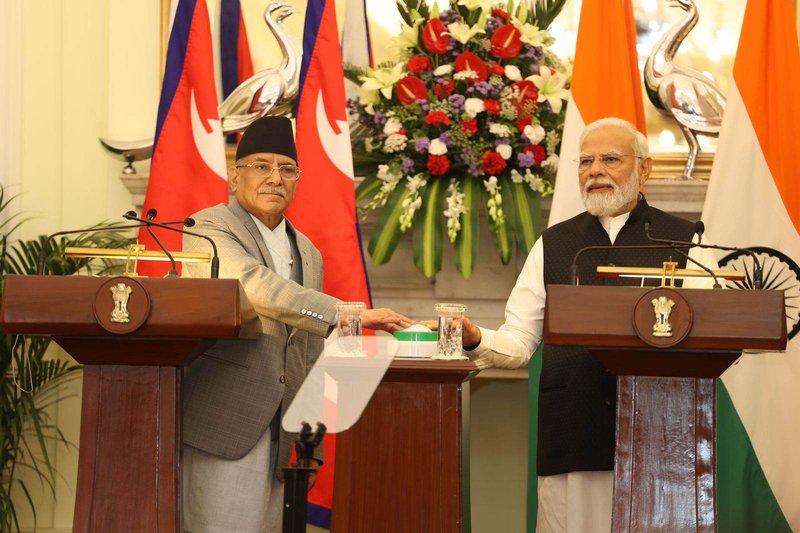
After the constitution was amended to include the disputed land at the triangular intersection of Limpiyadhura, Kalapani, and Lipulekh in Nepal's administrative territory, bilateral relations between Nepal and India reached their lowest point.
Seven Agreements
The visit was extremely beneficial for Prachanda because seven major agreements were signed between India and Nepal during this time. These agreements include the renewal of the Nepal-India Transit Agreement, the construction of oil pipelines from Amlekhganj to Chitwan and from Siliguri to Charali in Jhapa, the establishment of an integrated checkpoint at Chandni Dodhara, the 669 MW Lower Arun project with an Indian company, the agreement to be made by Fukot Karnali Indian Company, and the agreement between Nepal and India to conduct financial transactions.
Transit Trade Treaty
The transit treaty, which was inked in New Delhi and has guaranteed additional benefits for Nepal for more than 20 years, was one of the major agreements reached during the visit. Therefore, it shouldn't be considered a minor agreement.
The promotion of agricultural products and the ease of customs were also issues of emphasis during the discussions, along with the trade imbalance and smooth cross-border trade.
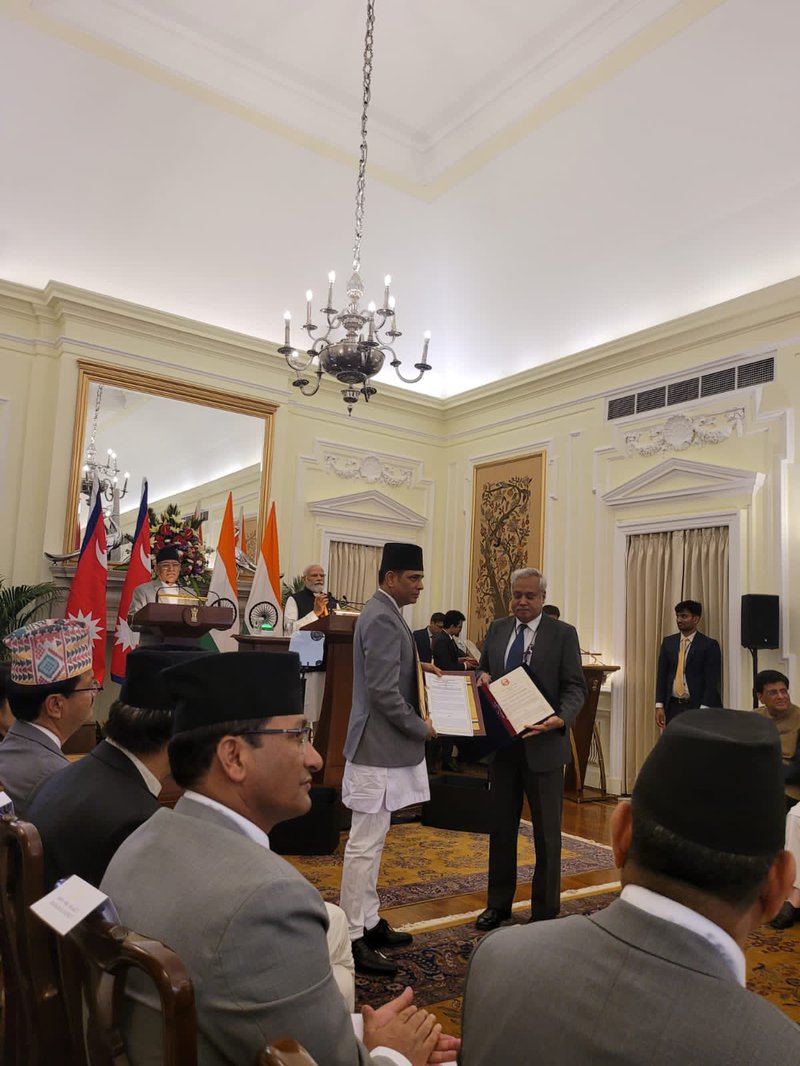
According to Prachanda, "My visit will contribute to fostering a climate of trust between the two nations."
The Nepal-India Transit Treaty of 1999, which has been updated, is regarded as being crucial for facilitating Nepal's international trade.
In the presence of Prime Ministers Pushpa Kamal Dahal Prachanda and Narendra Modi, Secretary of the Ministry of Industry, Commerce, and Supply Madhu Kumar Marasini and Ambassador of India to Nepal Naveen Srivastava signed and exchanged the protocol.
Ramesh Rizal, the minister of industry, commerce, and supply, and Piyush Goyal, the Indian minister of commerce, had earlier spoken about the agreement during the joint news conference of the two prime ministers in New Delhi, India.
As a member of the Prime Minister's visiting team, Marasini, Secretary of the Ministry of Industry, Commerce and Supply, stated that the Transport Treaty needs to be signed because it hasn't been renewed in the previous four years.
If the transit arrangement was not extended, it would be impossible for a landlocked nation like Nepal. Marasini thinks this is a fantastic accomplishment. He asserted that Nepal now has water, rail, and road connection to the sea.
Long-term Power Trade Agreement
A long-term electricity trading agreement between India and Nepal is seen as a major accomplishment by both nations, among other treaties.
The Indian Prime Minister Narendra Modi stated that India and Nepal have a "Long Term Power Trade Agreement" during a joint news conference that was conducted following the meeting with Prime Minister Prachanda at Hyderabad House.
A long-term power trade agreement has been signed between India and Nepal, and we have set a goal of importing 10,000 megawatts of electricity from Nepal in 10 years, said Prime Minister Prachanda and I today. "Today, Prime Minister Prachanda and I have taken an important decision to make our agreement a super hit in the future," said Modi.
The Indian Energy Exchange Market (IEX) has now given Nepal authorization to export electricity from multiple projects totaling 452 MW. The government is attempting to sell electricity through a contract since the average price is lower when electricity is sold in a competitive market. Nepal's hydropower has a 2,700 megawatt installed capacity.
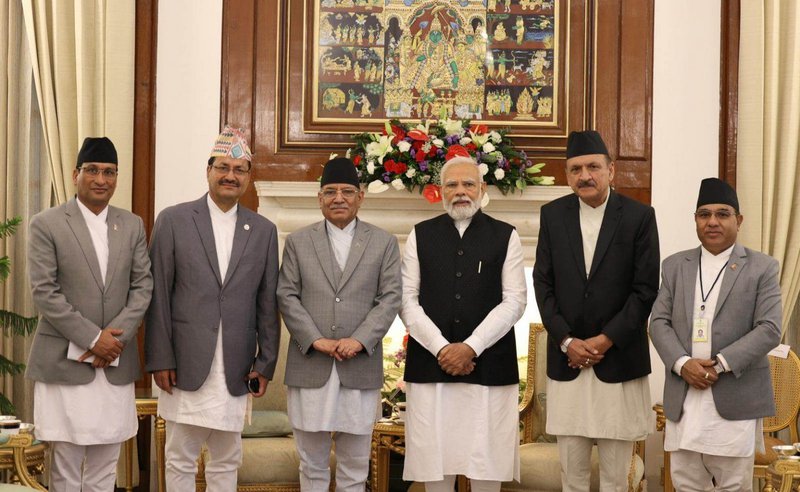
As the demand for power is 1750 MW during the peak season and electricity is produced according to the connected capacity during the rainy season, Nepal is under pressure to assure the export of roughly 1,000 MW of electricity to the Indian market in the upcoming dry season.
According to representatives of the Ministry of Energy, the inaugural agreement for long-term electricity trade has strengthened the security of Nepal's electrical market.
Inaugurated Railway
The railway service from Bathnaha to Budhanagar in Biratnagar, India, was also opened jointly by Prime Minister Prachanda and his Indian counterpart, Prime Minister Modi.
Businesspeople in the Koshi region have long asked for the railway carrying products from the border district of Bathnaha to the Biratnagar integrated check point to be opened and made more accessible.
Construction is in underway on the eight-kilometer railway line that would connect Biratnagar ICP station in India to Bathnaha. The railway underwent testing for train operation on October 8, 2018.
A similar event has occurred with the "New Butwal-Gorakhpur Cross border Transmission Line," which is essential for the transfer of power between India and Nepal.
Additionally, the transmission line is the second high capacity international transmission line. Additionally, a distinct business has been established for the project's construction. Both the Electricity Authority of India and the Nepal Electricity Authority have equal stakes in the business.
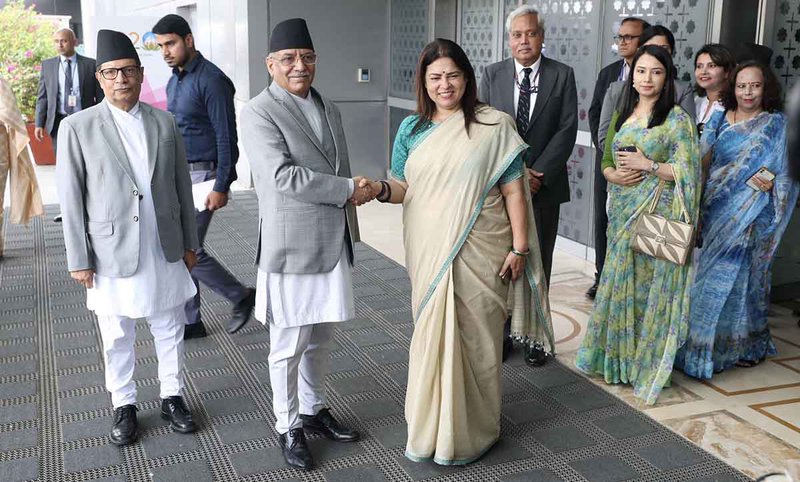
The second international transmission line between Butwal and Gorakhpur, a 400 KV project suggested by the NEA for the exchange of energy between Nepal and India, has already been paved.
The government of India's Power Grid Corporation of India Ltd. and the Electricity Authority both control 50 percent of the stock in the joint venture that was established to build the new Butwal-Gorakhpur 400 KV transmission line. The authority itself will construct the transmission line to Nepal.
Kulman Ghising, MD of NEA, expressed his opinion that the laying of the project's foundation stone will hasten its completion.
The investment form for the building of transmission lines was finalized during the seventh meeting of the mechanism of the Nepal-India Energy Secretary and Joint Secretaries on October 27–28, 2076. The project is anticipated to cost Rs. 4.62 billion (Rs. 7 billion 39 crore.
The project's expected cost is Rs 4.62 billion (Rs 7 billion 39 crore), and financial management would be split 80/20 between debt and equity.
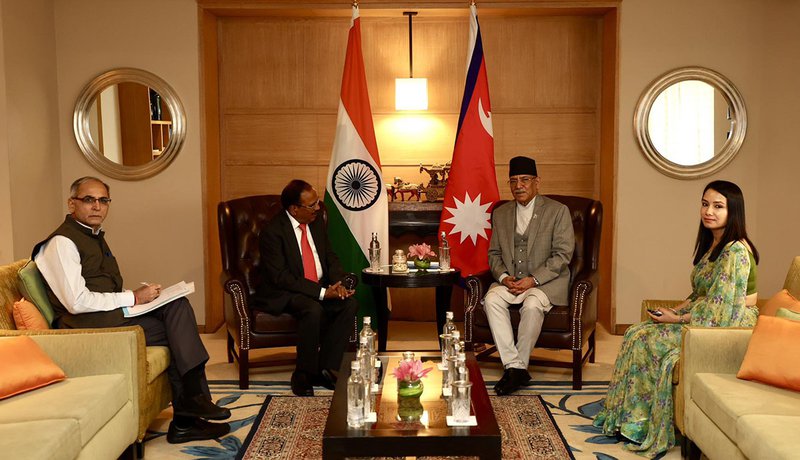
According to MD Ghising, the Butwal-Gorakhpur transmission line has nearly twice the capacity of the Dhalkebar-Muzaffarpur first inland 400 kV transmission line, which is now in use.
Although there were street protests before his effective and profitable visit by student unions linked to the main opposition CPN-UML and three communist parties, including his own, regarding India's absorption of Nepal into an old map, everything has now calmed down. As Prachanda stated in the legislature, relations between Nepal and India have resumed being friendly and personal.

Keshab Poudel
Poudel is the editor of New Spotlight Magazine.
- HELVETAS NEPAL’S RIVERBED FARMING: Shift From Overseas To Local Farming
- Jul 26, 2024
- POLITICAL SCENARIO : K.P. Sharma Oli's Resurgence
- Jul 21, 2024
- UNDP/MinErgy: An Inventive Approach To Clean Brick Kiln
- Jul 19, 2024
- HELVETAS NEPAL: Nutrition Through Riverbed Farming
- Jul 18, 2024
- NOU Opens To All: Dr. Shilu Manandhar Bajracharya, Vice Chancellor
- Jul 15, 2024






